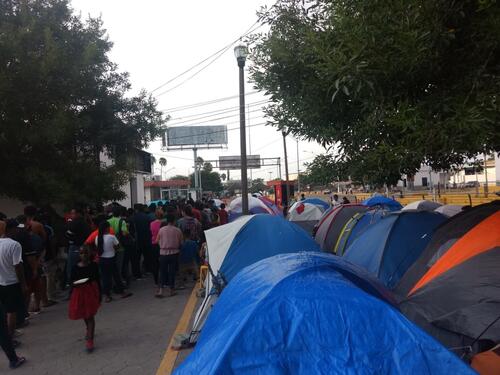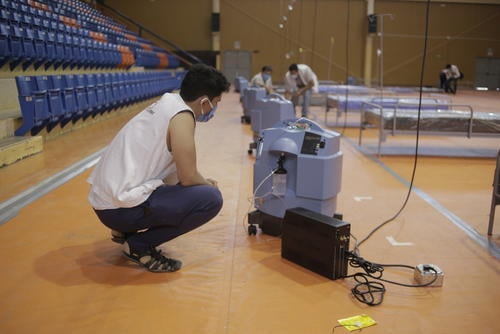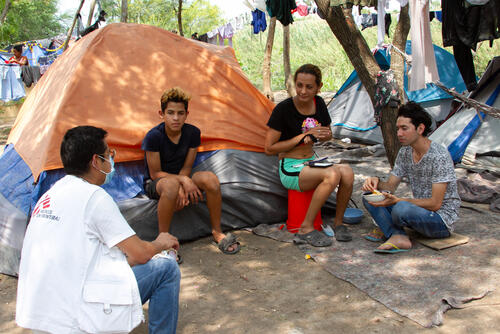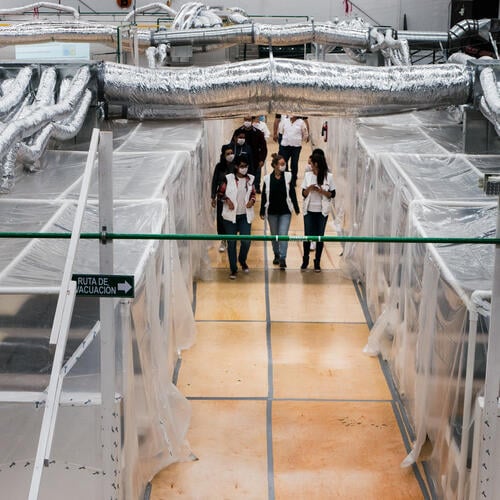On International Migrants Day, Nora Valdivia, mental health supervisor in Mexico, explains the reality and hopelessness that migrants and asylum seekers endure while living on the border between Mexico and the United States, specifically in Matamoros, where MSF has worked since June 2018.
Valdivia is a Médecins Sans Frontières (MSF) psychologist and witness to the impact that the United States’ and Mexico’s migration policies – such as the “Migration Protection Protocols” (MPP) – have on the life and health of thousands of people, many of whom are facing dangerous situations such as kidnapping.
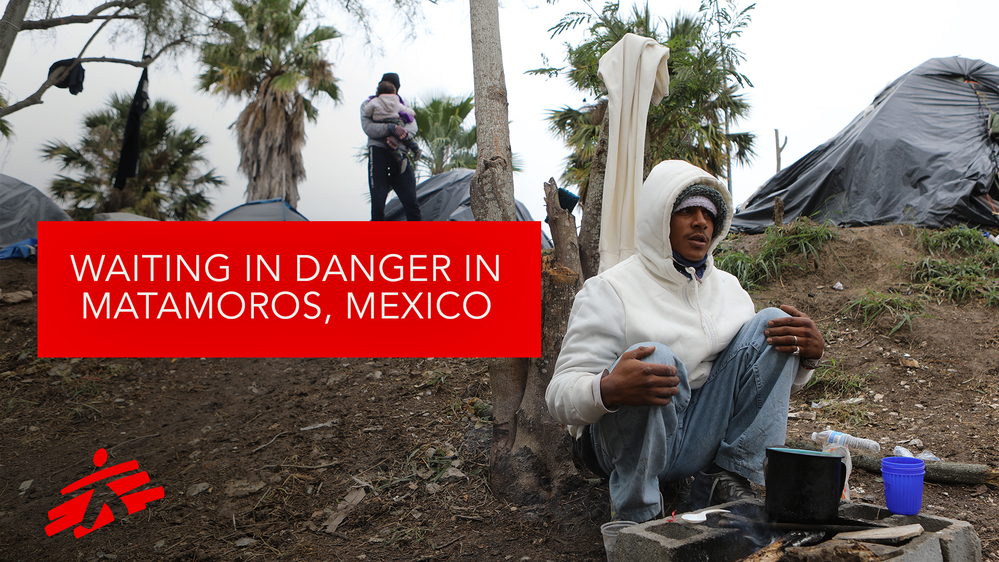
Waiting in Danger in Matamoros, Mexico
Asylum seekers in places such as Matamoros live in harsh conditions as they try to survive without knowing what will happen in the future. In Matamoros, they live outdoors in the cold, next to the Rio Grande or the international bridge that connects Mexico with the United States. These conditions generate and exacerbate physical and psychological issues, including respiratory infections and anxiety disorders.
MSF is the only humanitarian organisation offering mental health counselling to over 1,600 people currently living and waiting in tents in Matamoros. Many resist being moved because they are afraid; they resist, even as they endure such harsh conditions, because they don’t want to return to their countries of origin, where death is a constant threat.
“Walking along the international bridge, I encounter many complex situations,” said Valdivia. “The other day, a little three-year-old girl asked me if I live here; I told her I didn’t. Then she pointed to one of the small tents and told me she lived there. She told me she had a house (in Honduras) and that her dad used to work there, but now he isn’t working. I was astonished because the children, regardless of their age, can perceive the changes in their lives, the situations they are living in and their needs.
They arrive with mental health issues that increase during the journey through Mexico, where they also endure violence, extortion and sexual violence.
What consequences do mental health issues have on migrants and asylum seekers?
It varies, depending on the diagnosis. Psychological issues can cause physical symptoms because they impact the whole person. These people flee their countries; most of them do so because of violence. They arrive with mental health issues that increase during the journey through Mexico, where they also endure violence, extortion and sexual violence. On top of all that, they face discrimination, which also harms them.
What type of cases have you seen?
We have seen people who feel like they are having a “heart attack,” but are actually having a panic attack caused by anxiety. Anxiety is our primary diagnosis among the people we’re providing counselling for in Matamoros; 61 per cent of the consultations show this diagnosis. In these types of cases, as well as in others, MSF takes a comprehensive healthcare approach. We contemplate the medical part so we can have an overall evaluation and can rule out a physical health problem; that way, we can integrate the mental health component.
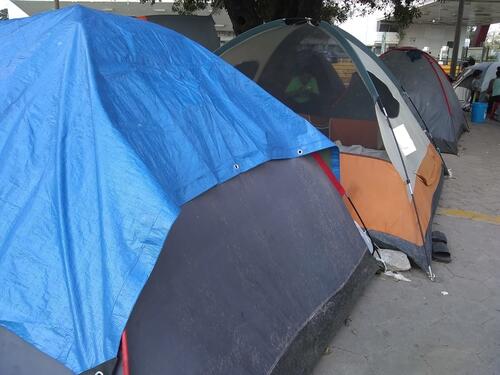
How is MSF working with asylum seekers in Matamoros?
We have a medical team that comes to the international bridge from Reynosa every Monday and Tuesday. On the other weekdays, we treat medical needs by working through local institutions. In the city we have a team with a psychologist, a social worker and a health promoter providing services from Monday through Friday. The psychologist holds individual and group sessions, the health promoter approaches people and talks to them about mental and emotional health, and the social worker offers support and provides referrals for people who need additional medical, social or legal support services. Shelters in the city also provide services.
Do people here understand why they could be in need of mental health services?
When we first approach them, they do not trust us, which is why the health promoter goes to every tent and explains our work. That is how she manages to get close to them. After that, we work on acceptance regarding their mental health and work to eliminate the stigma that this service is just for “crazy people”. Then we provide the consultations they need.
What is the MSF mental health service approach?
It’s a psychotherapy approach. Often, we have one-time sessions because this is a population that is constantly on the move. So, in a one-time session, you must do everything you can to take the patient out of their situation and give them the tools to face their problems and effectively manage their ongoing symptoms. Every session, we recommend that they seek follow up mental health care if feasible.
What is the value of these one-time sessions?
These sessions have an impact from the very moment a professional offers a confidential space to listen to them in a warm and empathetic way. People feel valued and validated. Generally, they don’t receive this type of service, so it is very valuable to them. Besides that, we give them self-care, relaxation and psycho-educational tools during the consultation.
Asylum seekers who have an appointment to start their asylum processes go to the first appointment and are given a second appointment date a year away.
What worsens people’s mental health issues?
Being on the US-Mexico border is dangerous. Migrants and asylum seekers come from their countries of origin with mental health symptoms, which get worse while they’re en route. Then they arrive and settle down for an indefinite amount of time. That exposes them to instances of violence, and they are living outdoors, in bad weather, vulnerable to health problems caused by these bad conditions. On top of that, the asylum seekers who have an appointment to start their asylum processes go to the first appointment and are given a second appointment date a year away. These people come back hopeless and they don’t want to stay here.
What do they do? How do they live with this hopelessness?
Resilience. They are people who adapt. They find the means. They have so much need that they adapt to the context. They have willpower. They resist. Past experiences force them to be strong. They are surviving.
What is the most vulnerable population?
Children are the most vulnerable to unsafe conditions and disease. More than 50 per cent of our patients are under 15 years old. Here we have a lot of children who come with their families, and the most common ailments are respiratory and digestive illnesses, representing 67 per cent of our cases. We see scratches and bumps. They are not living in adequate conditions.
What is the main challenge for MSF working with this population?
This is a constantly changing population. Every day we see new situations; and the context is volatile due to the violence. The city seems very safe, but it isn’t. They are also affected by the violence in other cities close to Matamoros, like Reynosa.
What is MSF most worried about?
We are worried about the constant exposure to violence (kidnapping, robbery, extortion, sexual violence) of a very vulnerable population. The asylum process appointment dates are often a year in the future, and that forces asylum seekers to go back to their countries of origin and exposes them, yet again, to violent situations and unsanitary conditions. In general, [we are worried about] the consequences of these policies, which dehumanise and endanger the lives of our patients.



